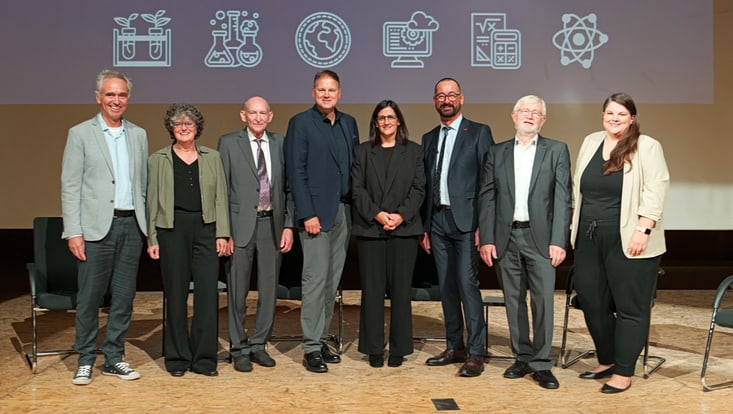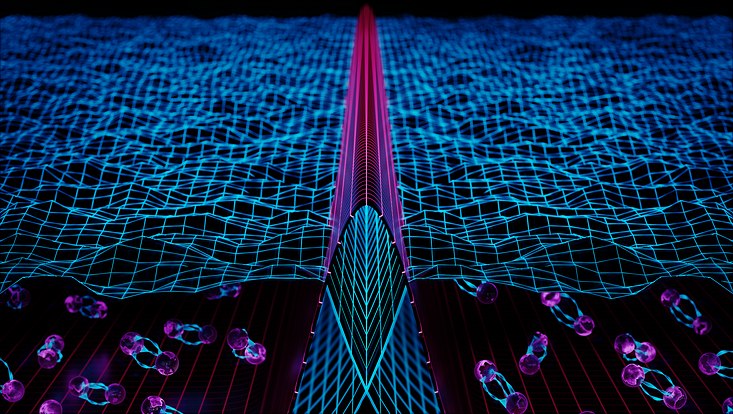Imaging of Matter
Future day in science for boys and girls
4 February 2025

Photo: kompetenzz.de
How does a nanomotor work? How are food samples analysed? How does programming work with the Calliope? At Girls‘ Day and Boys’ Day on 3 April 2025, the school laboratories ‘Molecules & Schools’ and ‘Light & Schools’ as well as various working groups from the Department of Physics will provide insights into scientific research, the everyday life of scientists and study and career opportunities.
Chemistry School Lab Molecules & Schools
Girls' Day: Einblick in die bunte Welt der Chemie (booked out)
Whether in medicine, renewable energy technology, energy storage or the latest television: nanoparticles are used in many areas of future technologies. As part of Girls' Day, the Molecules & Schools chemistry school lab will give girls aged 15 and older an exciting insight into the world of chemistry, especially into nanoscience. Several small experiments are planned, for example on the production of silver fractals, the chemical sunset, or the production of gold nanoparticles. In conversation with researchers and students, the girls will learn more about study and later career opportunities.
Boys' Day: Einblicke in die Lebensmittelchemie (booked out)
New developments in medicine, such as new vaccines or personalized cancer therapies, would not be possible without biochemistry. Boys' Day gives boys aged 15 and older an insight into the world of chemistry and identify an unknown meat sample with the help of DNA analysis. They can exchange ideas with researchers and students, learn interesting facts about study and career opportunities, and identify an unknown meat sample with the help of DNA analysis.
Physics School Lab Light & Schools
Girls' Day: Forschung entdecken mit Minicomputern (booked out)
Building a robot monster that responds to stimuli from the environment? In the physics school lab, students aged 11 to 13 who have no experience in programming are introduced to the Calliope mini. It enables a playful approach to programming microcontrollers, so that the schoolgirls can easily gain a good understanding of the inner workings of smart devices, such as smartphones. After some initial small experiments, the girls will build and program their own monster so that it can move connected motors and wheels on its own. The tutors from the Light & Schools team will support the group and be available to answer questions about physics and studying. (Booked out)
Girls' Day: Science Escape Game: Helft Prof. Lisa Kareem und löst ihre Rätsel (booked out)
To kick things off, a scientist will report on research in the Cluster of Excellence "CUI: Advanced Imaging of Matter" and answer questions. For example, how the properties of materials can be influenced by the use of light. Then the Science Escape Game will begin, following in the footsteps of fictional Prof. Lisa Kareem. Students aged 13 to 15 will explore the Bahrenfeld campus in a rally and solve an Escape Room. They are supported by tutors from Light & Schools and work together as a team.
Boys' Day: Kunst hilft weiter (booked out)
Basic research is often very complex and far away from everyday life. In this program, the boys will learn about science communication. They will get an insight into how science content is presented with the help of pictures, sculptures or 3D models. A member of the project "Arts & Science" of the Cluster of Excellence "CUI: Advanced Imaging of Matter" will lead through the program and explain the way of a photo from a laboratory to the hallway of the Hamburg City Hall.
Department of Physics
Girls' Day: Von der Rakete zum Nanomotor (booked out)
Physics can be exciting and explain many everyday phenomena, such as recoil. At four different stations, the girls will make a small rocket, solve whether you can move a boat forward by throwing stones out of it, or find out how nanomotors could help in medicine. In small groups and with the support of a large team of supervisors, there will be plenty to try out and experiment with.
The school labs are funded by the Cluster of Excellence "CUI: Advanced Imaging of Matter", which also supports the Department's program of Girls' Day.
More projects from the MIN faculty (in German).
General information about Girls' Day (in German).
General information about Boys' Day (in German).


